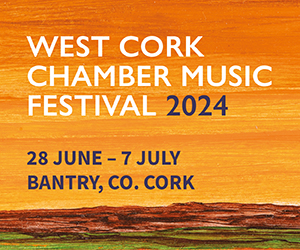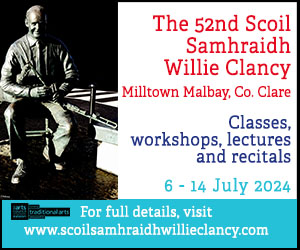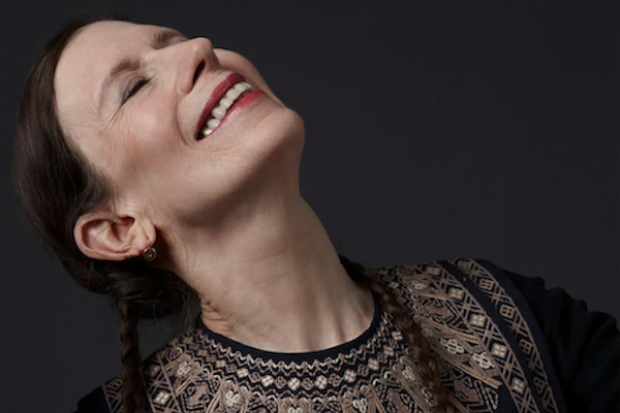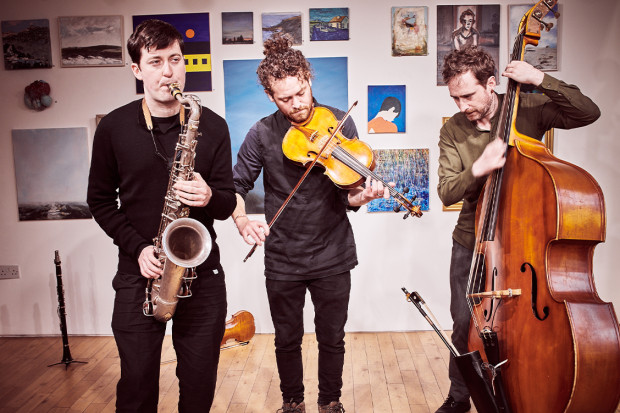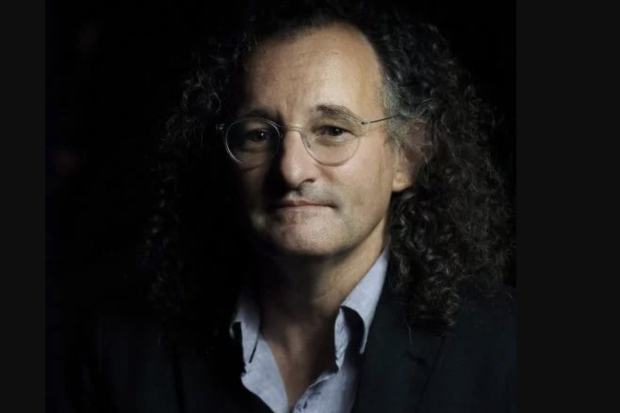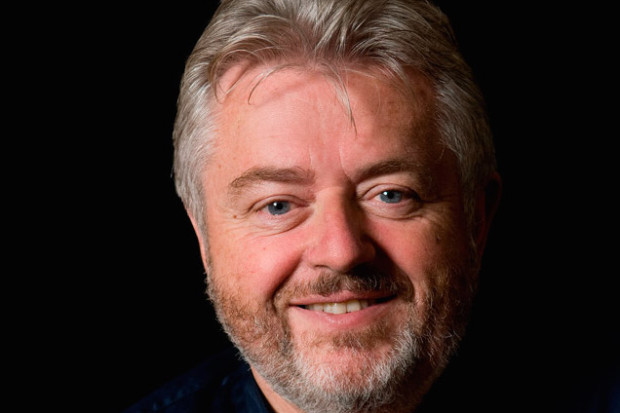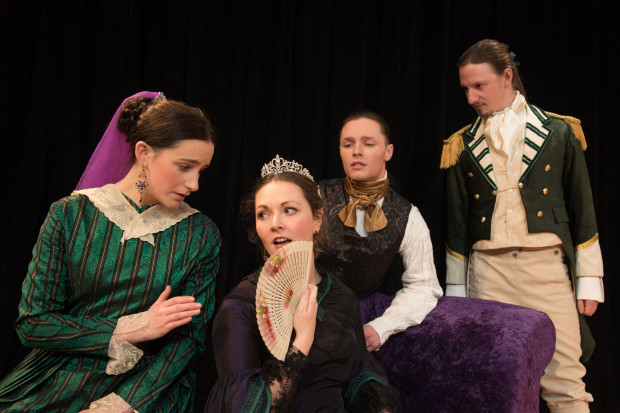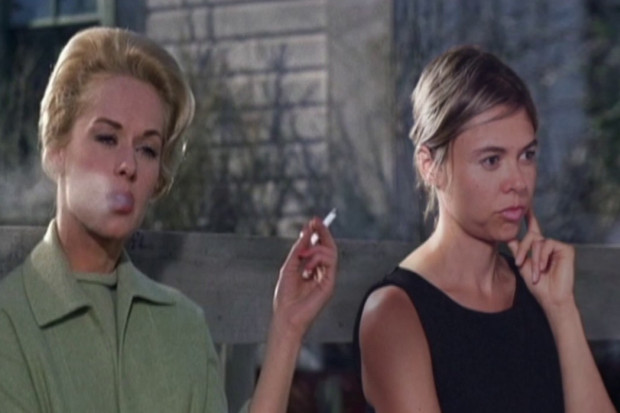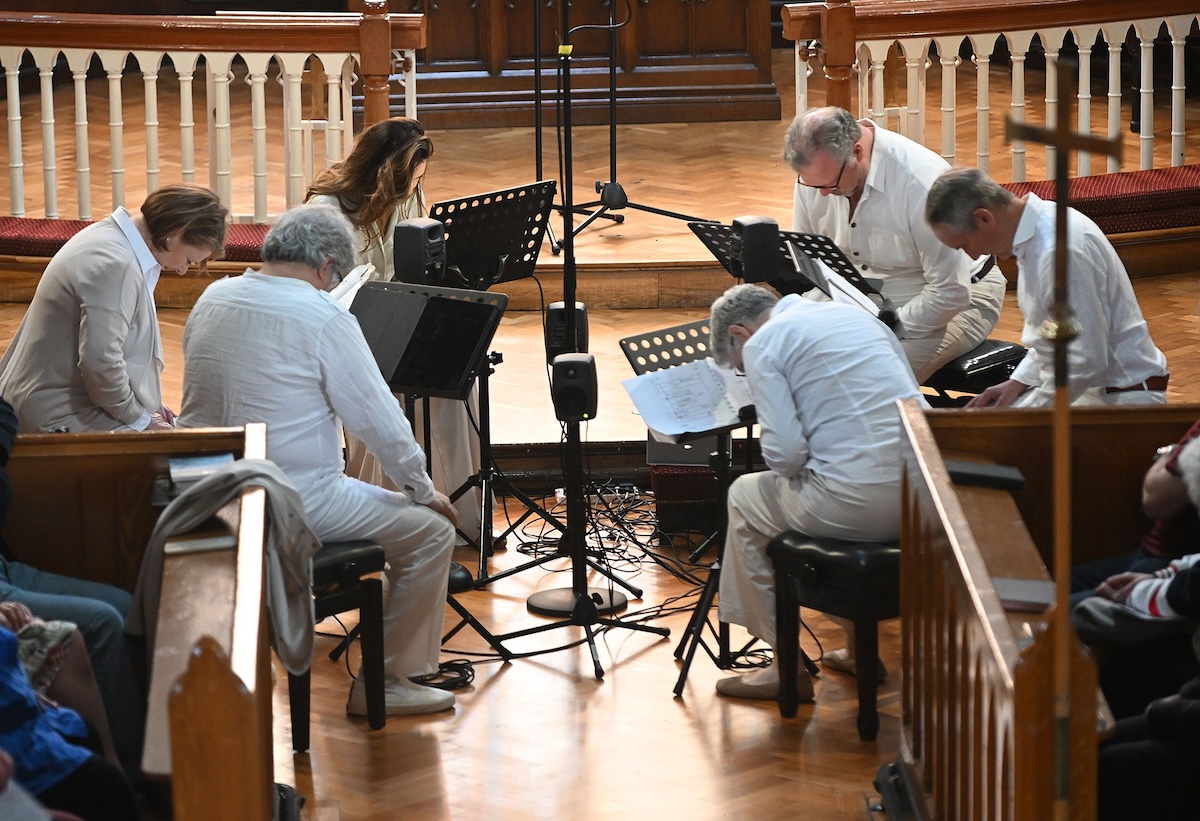
Neue Vocalsolisten (Photo: Ken Finnegan)
A Festival Drawn to the Introspective
Louth Contemporary Music Society always manages to come at its music with a slant, and the title of this year’s festival, after the record label of featured composer Robert Ashley, was ‘Lovely Music’. The festival took place on the weekend before last, from the 14th to the 15th of June, and the title immediately invites speculation as to the nature of the loveliness found within. Because, regardless of prettiness, any contemporary music festival devoted to loveliness is bound to feature some surprises as to what that means.
To the best of my knowledge, I hadn’t encountered Ashley before this festival, and I decided to let the festival be my first experience of actually hearing the American composer’s work. His opera Crash, which constituted the opening concert at An Táin Arts Centre on 14 June, comes from the end of a long career. It was performed by the Varispeed Collective, with whom the composer collaborated on its creation in the final months of his life a decade ago.
Crash begins conversationally, with the first of three narrators speaking as if on a phone, appending assertions (some stuff about the masculine life being divided into 14-year cycles) with a self-certain ‘Yeah’. Each performer sits at a desk, speaking or chanting into a microphone and reading from their score, and a paucity of musical material ensures a focus on the words. The second narrator speaks in a half-singing style while the third has a slight stammer, describing his life (three of the performers were female, but the narrator’s voice and perspective is male) year-by-year, with particular emphasis on the nadirs felt as each 14-year set ends. As this progresses, the remaining three performers chant quiet cross-rhythms with words just at the threshold of perceptibility. Each performer takes each narrator’s voice once, showcasing a variety of approaches to the material.
Crash seems to be written with autobiographical intent – the second narrator’s stammer is drawn from Ashley’s own voice, and much of the subject matter revolves around the career of a composer of ‘out-there’ opera – but it’s so unconcerned with other people as to be downright solipsistic. Nobody is named, the narrator included, and nobody but the narrator is given anything more than the faintest thumbnail sketch, so when he leaves his wife at 42, it’s seen only as a consequence of his 14-year cycle, and as an opportunity for a new beginning for him.
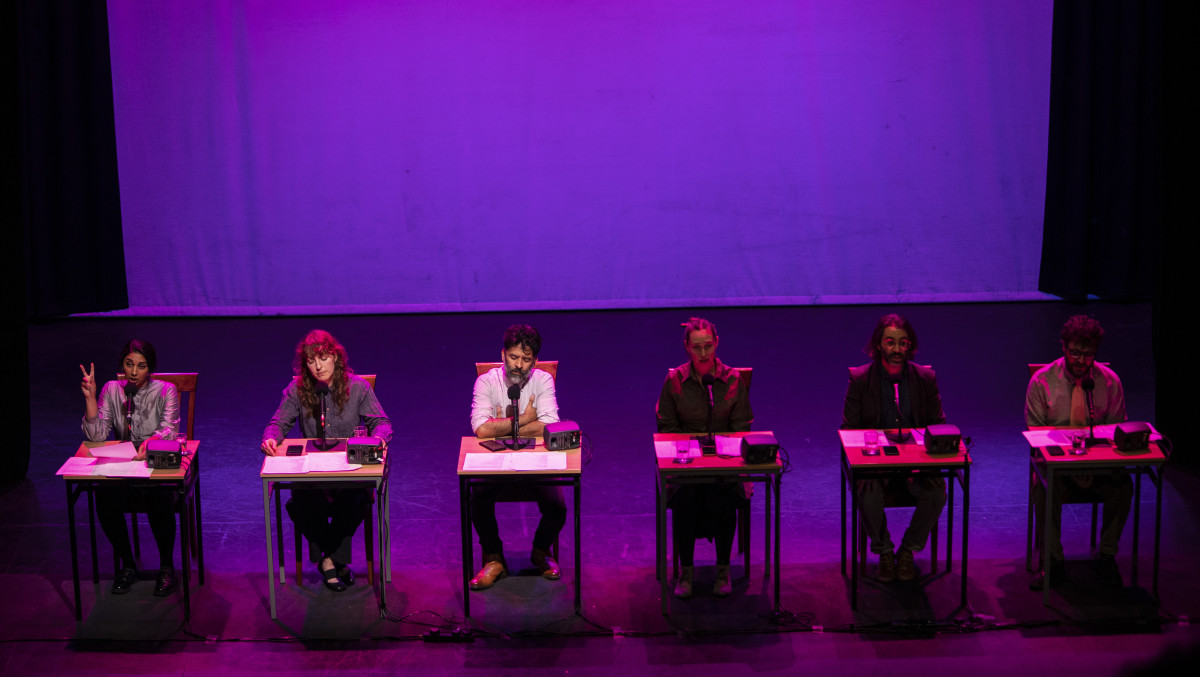 The Varispeed Collective performing Crash (Photo: Alannagh Brennan)
The Varispeed Collective performing Crash (Photo: Alannagh Brennan)
I lost patience with Crash fairly early, though it’s possible I would have been more sympathetic to Ashley’s approach had I first heard ‘The Bar’ episode from his much earlier opera Perfect Lives, which was performed by the same group the following evening at the Spirit Store. Again the performers took turns as the narrator (though with Amirtha Kidambi solely performing the role of Buddy, ‘the world’s greatest piano player’), supported by two members of the group on piano and the Irish musicians Caoimhe Hopkinson on bass, drummer Sean Carpio, and saxophonist Steve Welsh. Here there was much more of a party atmosphere, the performers selling a believably laid-back delivery from Ashley’s tightly described score, with a solid 14-beat groove on piano and bass providing a much livelier atmosphere.
I kept thinking of Tom Waits’ work from the 1970s, especially songs like ‘Step Right Up’ or ‘Emotional Weather Report’. Their approaches couldn’t be more different – Waits is instinctive and improvisatory, while Ashley is controlled and rigorous, but both evoke an almost mystical Americana (Perfect Lives was written for television, and a lot of Ashley’s music draws from soap operas), and both have an understanding of the musicality of American English as spoken or half-sung.
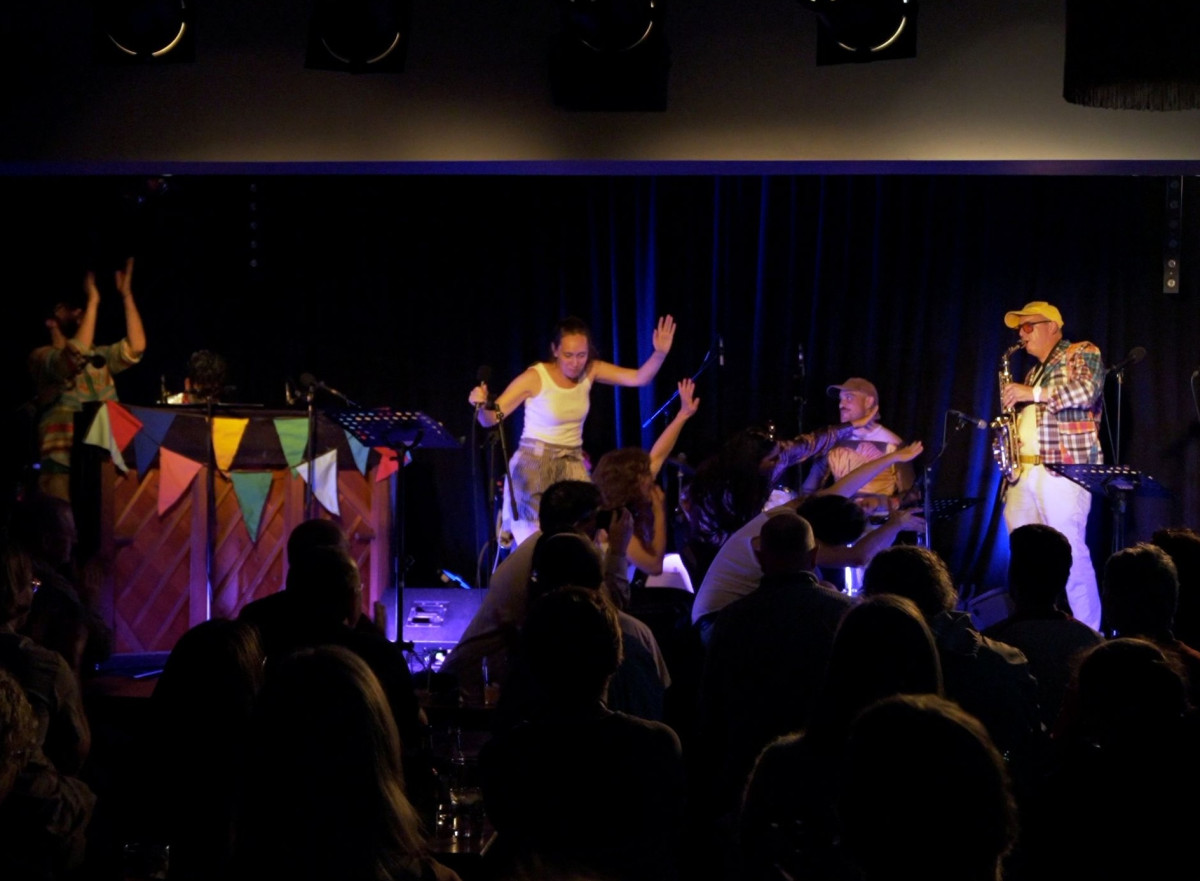 The Varispeed Collective performing ‘The Bar’ (Photo: Tim Shearwood)
The Varispeed Collective performing ‘The Bar’ (Photo: Tim Shearwood)
Down a dirt road
Saturday’s concerts began, though, with Linda Catlin Smith. Her hour-long Dirt Road for violin and percussion was performed by Larissa O’Grady and Caitriona Frost at St Vincent’s Chapel at 1pm on Saturday. Each of the work’s fifteen movements builds, then develops, a slow, soft pattern. By contrast, there’s no great sense of development across the movements – and this is part of the point, with the composer leaving the movements open to rearrangement or omission, suggesting a work of varied environments, not necessarily linked; the dirt road of the title doesn’t necessarily have to lead anywhere in particular. This leads to a work that’s rather episodic in nature, but there are some links between movements – the first, for example, features a single note on the violin, drifting in and out of harmonics, with occasional punctuation from the percussion; the second begins with the violin on that same note before starting onto a melodic path with the vibraphone.
The combination of violin and percussion is one of the most fascinating things about this work, a conscious choice by the composer to challenge herself by writing for such a distinct pair. It creates a work of two characters, their timbres so different that even when they play the same notes it feels more like they’re playing in tandem than in unison. The patterns themselves are a masterclass in control, the music so spare that every note is exposed, and the performers matched the challenge.
An opportunity to unwind
Hamza El Din’s Escalay was the featured work at the first of two concerts at St Nicholas’ Collegiate Church, and this concert – more traditional in nature than the others at the festival – allowed an opportunity for the audience to unwind. The Nubian composer released this work, the title of which means ‘Water Wheel’, in 1971, and it proved a strong influence on early minimalists. Originally composed for the oud, this version was performed with the Syrian oud player Rihab Azar, joined by the Irish musicians Zoë Conway and Inni-K, both of whom played fiddle, with the latter also singing. Like the preceding works, repetition was key here, though (appropriately to the title) the effect was rather one of constant movement than of ritual stasis, with the oud providing some thrilling counter-rhythms under the melodies.
This was the only concert at the festival not devoted to a single work; before Escalay, each of the performers played a couple of pieces on their own. Conway was first, with her own composition Bearna Mheabh, opening the concert. This was a real crowd-pleaser, starting as a slow air before flowering into a reel-like passage in 7/8 and collapsing into a jig. Azar then played a pair of pieces, Enchanted Weavers and Biography of a Bubble, and Inni-K sang the traditional songs ‘Éamonn an Chnoic’ and ‘Úirchill an Chreagáin’, on the former accompanying herself on a handheld synthesiser, its ethereal sound blending beautifully with her voice.
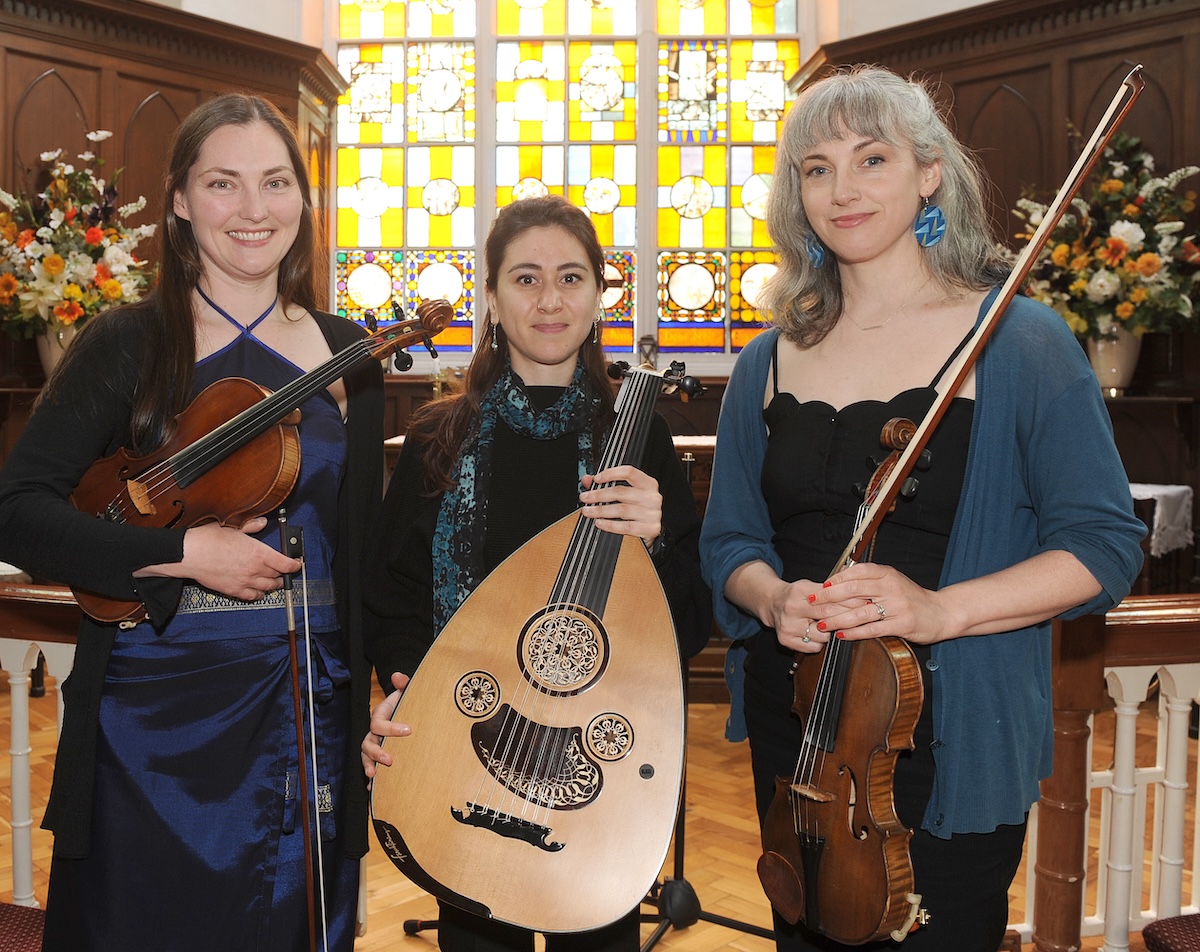
Zoë Conway, Rihab Azar and Inni-K (Photo: Ken Finnegan)
The second concert at St Nicholas’ was Stockhausen’s Stimmung, performed by Neue Vocalsolisten as the last concert of the festival. This 1968 work is almost a study in consonance, built around the overtone series above B flat. Facing inward, the six members of the group sang into microphones which resonated through speakers placed about the church. Beginning with overtone singing, the work moves through several sections, often drawing on ‘magic names’ – gods or goddesses from various cultures – or other words – days of the week, for instance – declaimed or sung by the musicians and osmosed into the overall sound. It’s sparse music, difficult to describe in effect without simply stating what it does. But Neue Vocalsolisten, unsurprisingly for a festival of the calibre of this one, performed it brilliantly, their voices creating a wash of colour throughout the church.
Stimmung was an unusual choice to close the festival. Previous years have seen closing concerts that emphasise the community nature of the festival itself, whether that’s through a rousing performance of Terry Riley’s In C by traditional musicians or bringing in the local school orchestra to play Gavin Bryars’ Jesus’ Blood Never Failed Me Yet. Stimmung was well-received, but is, I think, a far more challenging way to end the weekend than is typical.
It was of a piece with the overall mood of the festival, though, which I felt was more solemn than previous years, almost more prayerful. I’ve noted previously that the programming of Louth Contemporary Music Society is incredibly diverse but is frequently drawn to music which, regardless of other characteristics, is introspective and ritualistic. This may never have been more true, with only two of this year’s concerts (Escalay and ‘The Bar’) even rising above a mezzo piano.
But whether in Catlin Smith’s contemplative patterns or Stockhausen’s vast consonance or Ashley’s explorations of lives, there was a loveliness there all the same.
Visit www.louthcms.org.
Subscribe to our newsletter.
Published on 26 June 2024
Brendan Finan is a teacher and writer. Visit www.brendanfinan.net.







